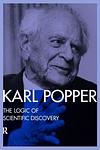Karl Popper
Karl Popper was an influential philosopher of science, born in Vienna in 1902. He is best known for his rejection of the classical inductivist views on the scientific method, in favor of empirical falsification. His most significant works include 'The Logic of Scientific Discovery' and 'The Open Society and Its Enemies'. He argued that scientific theories cannot be proven but can only be tested and potentially falsified. Popper's ideas contributed to the philosophy of science and the scientific method during the 20th century.
Books
This list of books are ONLY the books that have been ranked on the lists that are aggregated on this site. This is not a comprehensive list of all books by this author.
-
1. The Open Society
This book is a critique of totalitarianism and a defense of liberal democracy. The author argues against the concept of a perfect, immutable society, instead advocating for an "open society" that allows for constant change and improvement. He criticizes theories of historical determinism and the notion of "the collective", emphasizing the importance of individual freedom and human rights. The book also examines and challenges the philosophies of Plato, Hegel, and Marx, linking their ideas to the rise of fascism and communism in the 20th century.
-
2. The Logic of Scientific Discovery
This book is a significant work in the philosophy of science, proposing a methodology for scientific discovery that challenges traditional inductive reasoning. The author argues that scientific theories can never be proven definitively, but can only be corroborated or falsified through empirical testing. He introduces the concept of falsifiability as the key criterion for distinguishing scientific theories from non-scientific ones. The book also delves into the problems of induction, demarcation, and the relationship between theory and observation in scientific practice.

